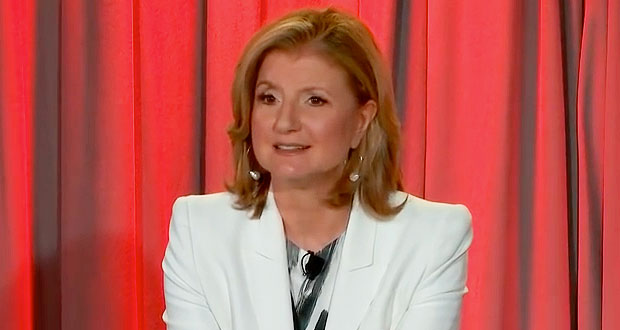Arianna Huffington on Thursday announced she would leave her position as editor-in-chief of the eponymous publication she cofounded 11 years ago to focus on her latest project — Thrive Global, a lifestyle, health and wellness site.
The reasons for her exit from The Huffington Post may be more complicated than that, however. Possible contributing factors include restiveness among staff over her leadership and judgment, reported clashes with AOL CEO Tim Armstrong, and concerns over Verizon’s purchase of Yahoo last month. (AOL purchased the Post in 2011, and Verizon purchased AOL last year.)
Taking Her Own Advice
Huffington earlier this year launched Thrive Global, which offers training, seminars, e-courses, coaching and ongoing support designed to help reduce stress. The initial plan called for a separate management team to run Thrive Global, while Huffington’s primary focus would remain on The Huffington Post.
“When I wrote to you in June, I fully expected to be able to continue leading HuffPost while also building Thrive Global,” Huffington wrote in a memo to staff announcing her decision to step down. “But it became clear that this was an illusion as Thrive went from an idea to a reality, with investors, staff and offices. One of the Thrive principles is knowing when it’s time for a new chapter to begin, and for me that time has arrived. And so I’ve decided to step down as HuffPost’s editor-in-chief.”
Huffington on Thursday also announced the closing of a Series A funding round for Thrive Global.
Too Many Chiefs
“Is this the equivalent of A-Rod leaving the Yankees, or was this mutually agreed upon?” wondered Mike Goodman, a research director at Strategy Analytics. “Is this the first part of Verizon taking more ownership over AOL properties, being more active in their management — and is [her departure] an outgrowth of that?”
The organization might have become too top-heavy.
“There were likely too many CEO types with strong opinions in the firm,” observed Rob Enderle, principal analyst at the Enderle Group.
“You can’t really have more than one captain of a ship, and AOL/Yahoo/Verizon currently does,” he told the E-Commerce Times. “Huffington, being one of the least powerful, either saw the writing on the wall or was hit over the head with it.”
Her involvement in Thrive Global “would also have been a problem,” Enderle suggested. “Typically, employees at any level aren’t allowed to hold significant positions in other firms.”
Conflicts of Interest?
Some of The Huffington Post’s staff reportedly had become uneasy over Huffington’s strong promotion of content centered on sleep issues, as it seemed she was using the publication to promote her books, Thrive and The Sleep Revolution.
There also reportedly were concerns that the Post last spring rejected the pitch of a story unfavorable to Uber just prior to Huffington’s appointment to its board of directors.
The Next Chapter
How Huffington’s departure will impact The Huffington Post is not yet clear.
“There are not many Internet personalities whose name is synonymous with their brand, where their persona and brand are fully tied together,” Strategy Analytics’ Goodman noted.
“When your brand is so closely tied to an individual, it’s easy for things to become polarizing, as happened in Martha Stewart’s case,” he said. “It’s easier to create a brand reputation when it’s not tied to an individual.”
The Post, which won a Pulitzer Prize in 2012 for a series on wounded veterans, provided a liberal counterweight to right-wing publications such as Breitbart and the Drudge Report.
With Huffington’s exit, that might change, suggested Enderle. “Near term, I think you’ll likely see it become a bit more centrist.”
























































Excellent post! I admire for this great post and believe that only great writers can write such an article. I think Richard has good experience in this area.